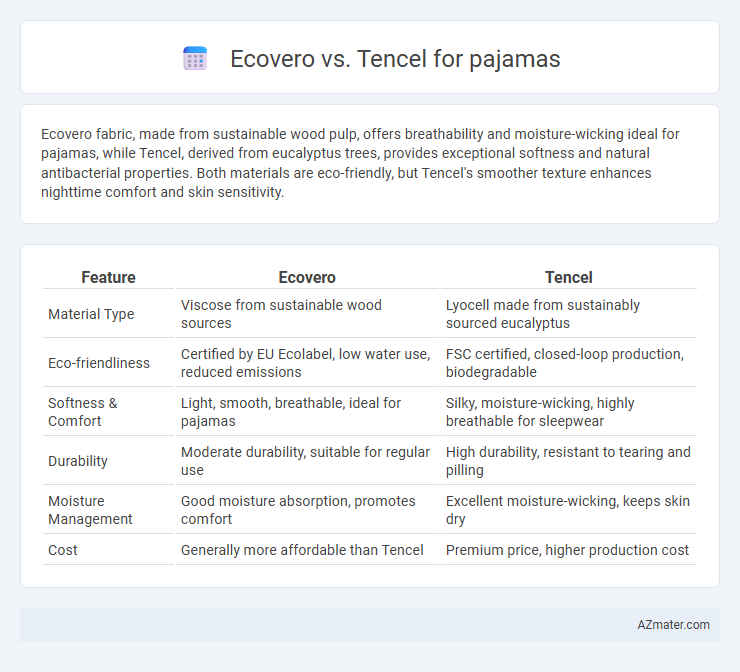Ecovero fabric, made from sustainable wood pulp, offers breathability and moisture-wicking ideal for pajamas, while Tencel, derived from eucalyptus trees, provides exceptional softness and natural antibacterial properties. Both materials are eco-friendly, but Tencel's smoother texture enhances nighttime comfort and skin sensitivity.
Table of Comparison
| Feature | Ecovero | Tencel |
|---|---|---|
| Material Type | Viscose from sustainable wood sources | Lyocell made from sustainably sourced eucalyptus |
| Eco-friendliness | Certified by EU Ecolabel, low water use, reduced emissions | FSC certified, closed-loop production, biodegradable |
| Softness & Comfort | Light, smooth, breathable, ideal for pajamas | Silky, moisture-wicking, highly breathable for sleepwear |
| Durability | Moderate durability, suitable for regular use | High durability, resistant to tearing and pilling |
| Moisture Management | Good moisture absorption, promotes comfort | Excellent moisture-wicking, keeps skin dry |
| Cost | Generally more affordable than Tencel | Premium price, higher production cost |
Introduction to Ecovero and Tencel Fabrics
Ecovero is a sustainable fabric made from certified renewable wood sources using an eco-responsible production process that reduces emissions and water consumption by up to 50% compared to conventional viscose. Tencel, produced by Lenzing, is a brand of lyocell and modal fibers derived from sustainably sourced eucalyptus, beech, and spruce trees through a closed-loop process that recycles water and solvents. Both Ecovero and Tencel offer breathable, soft, and durable materials ideal for pajamas, with a strong emphasis on environmental sustainability and comfort.
Sustainability Comparison: Ecovero vs Tencel
Ecovero and Tencel both offer sustainable options for pajamas with key differences in environmental impact and production processes. Ecovero fibers are derived from certified renewable wood sources and produced with up to 50% lower emissions and water usage compared to conventional viscose, certified by the EU Ecolabel. Tencel, produced by Lenzing, uses sustainably harvested wood and a closed-loop production process that recycles water and solvents, significantly reducing ecological footprint and ensuring biodegradability.
Softness and Comfort: Which Feels Better for Pajamas?
Ecovero, made from sustainably sourced wood pulp, offers a soft, breathable fabric ideal for pajamas that regulate temperature and wick moisture effectively. Tencel, derived from eucalyptus trees, is renowned for its exceptional softness, smooth texture, and hypoallergenic properties, creating a luxurious feel against the skin. When comparing softness and comfort for pajamas, Tencel generally provides a silkier, more breathable experience, while Ecovero delivers a slightly firmer but equally comfortable wear with strong environmental benefits.
Moisture Wicking and Breathability Differences
Ecovero fabric, derived from sustainable wood sources, offers moderate moisture-wicking properties suitable for casual pajamas, while Tencel, made from eucalyptus fibers, excels with superior breathability and moisture management, keeping skin dry and comfortable. Tencel's microfibril structure allows for enhanced air circulation and rapid moisture absorption, making it ideal for pajamas designed for warmer climates or active sleepers. In contrast, Ecovero provides a balance of eco-friendliness and softness but may retain slightly more moisture, impacting breathability during prolonged wear.
Durability and Longevity of Ecovero and Tencel Pajamas
Ecovero pajamas offer enhanced durability due to their semi-synthetic fibers derived from sustainable wood sources, providing resistance to wear and maintaining softness after multiple washes. Tencel pajamas, made from lyocell fibers, are known for their strength and moisture-wicking properties but may be slightly less resilient under frequent heavy use compared to Ecovero. Both fabrics ensure long-lasting comfort, though Ecovero's reinforced fiber structure generally contributes to greater longevity in everyday pajama wear.
Skin Sensitivity and Hypoallergenic Properties
Ecovero fibers, derived from sustainably sourced wood pulp, offer excellent breathability and moisture-wicking properties, making them highly suitable for sensitive skin in pajamas. Tencel, made from eucalyptus cellulose, is renowned for its ultra-soft texture and hypoallergenic qualities, reducing irritation and promoting comfort for those with skin sensitivities. Both materials are biodegradable and eco-friendly, but Tencel's smoother fiber structure often provides a gentler touch against delicate skin.
Eco-Friendly Manufacturing Processes
Ecovero and Tencel both utilize sustainable manufacturing processes, with Ecovero produced from certified sustainable wood pulp through a closed-loop process that recycles water and solvents, significantly reducing environmental impact. Tencel, derived from eucalyptus, beech, and spruce trees, employs an eco-friendly lyocell process that recycles over 99% of chemicals and uses low-impact dyes for minimizing waste and energy consumption. Both fibers prioritize biodegradability and reduced carbon footprint, making them highly eco-friendly choices for pajamas.
Design, Color Retention, and Style Versatility
Ecovero fabric offers excellent color retention and vibrant hues, making it ideal for pajamas that maintain their fresh look after multiple washes. Tencel excels in breathability and softness, providing superior comfort and style versatility for both casual and elegant pajama designs. Both materials support sustainable fashion, but Ecovero's durability favors long-lasting color, while Tencel enhances drape and movement in various pajama styles.
Price Point and Value Analysis
Ecovero and Tencel offer sustainable fabric choices for pajamas, with Ecovero generally positioned at a more affordable price point due to its eco-certified viscose production process. Tencel, derived from sustainably sourced eucalyptus fibers by Lenzing, typically commands a higher price reflecting its superior moisture-wicking properties and durability. Value analysis favors Tencel for long-term comfort and performance, while Ecovero suits budget-conscious consumers seeking environmentally friendly options without premium pricing.
Final Verdict: Which is Better for Pajamas?
Ecovero and Tencel both offer sustainable, eco-friendly fabrics ideal for pajamas, with Ecovero known for its reduced environmental impact through efficient wood sourcing and lower emissions, while Tencel excels in moisture-wicking, breathability, and softness. Pajamas made from Tencel typically provide superior comfort and temperature regulation, making them better suited for sensitive skin and warm climates. For eco-conscious consumers prioritizing fabric performance and skin feel, Tencel emerges as the better choice for pajamas despite both fabrics being sustainable options.

Infographic: Ecovero vs Tencel for Pajama
 azmater.com
azmater.com